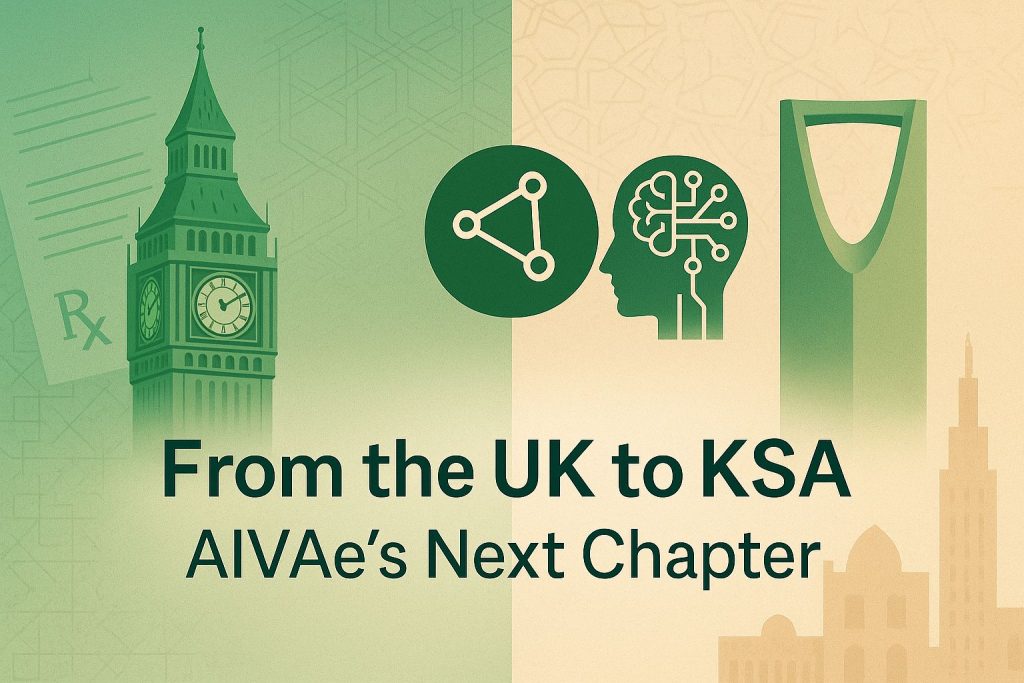Over the last year I’ve focused AIVAe, PharmBot AI’s clinical assistant on one thing: helping pharmacy teams make safer, faster decisions with clean documentation and clear accountability. We built Version 1 for the realities of UK practice: real-time prescription support, concise clinical prompts, and audit-ready notes that stand up to inspection.
That foundation is now strong enough to take the next step. I’m preparing to establish a regional presence in Riyadh (target: around the New Year) so we can work with Saudi organisations more closely on their terms.
This post explains what isn’t changing, what will adapt for KSA, and what’s next for AIVAe.
What isn’t changing (our non-negotiables)
- Decision support, not decision making. AIVAe augments professionals; the pharmacist remains accountable.
- Governance and auditability first. Every prompt and action is traceable; workflows align with regulator expectations; patient safety trumps novelty.
- Practical impact. We measure minutes saved, errors intercepted, and documentation quality not vanity metrics.
- Transparency. If something isn’t ready, I’ll say so. If a deployment needs tailoring, we’ll show you exactly how.
What will adapt for KSA
AIVAe is currently UK-configured. For KSA, we’ll adjust three layers:
- Language & UX
- Arabic-first interface with right-to-left layouts and bilingual prompts.
- Clinical phrasing tuned for local practice and patient communication.
- Deployment & data residency
- Options for in-KSA hosting (private cloud/VPC) or on-premises in hospital environments.
- No model training on customer data; clear data-handling and retention controls.
- Integration & governance
- Standards-based connections (e.g., FHIR/HL7) for medication, allergy, and observation data.
- Local governance alignment (policies, approval flows, clinical oversight, audit logs).
- Configurable safeguards for high-risk medicines and remote/tele-pharmacy pathways.
If you’re weighing Arabic voice, we can evaluate that too provided it meets the same audit and data-control bar.
Where AIVAe is today (Version 1)
- Prescription support: surfaces interaction risks, missing info, and red flags for human review.
- Clinical prompts: condition-specific nudges that are short, relevant, and dismissible.
- Documentation: structured, audit-ready notes generated alongside the work.
- Workflow fit: runs beside your existing systems; no rip-and-replace to get value.
AIVAe has been piloted with UK sites, nominated for multiple national awards, and was showcased at FIP 2024, which opened helpful conversations internationally. We continue to liaise with UK regulators (MHRA, GPhC) around safe, auditable AI use a discipline we’ll carry into KSA projects.
What’s next (the roadmap)
Near-term (next 3–6 months):
- Arabic localisation and bilingual prompts.
- In-region deployment patterns (VPC/on-prem) with security baselines (MFA, RBAC, encryption, SIEM logging).
- Service packs: pre-built workflows for immunisation, travel health, and private prescribing documentation.
Medium-term (following phases):
- Patient-facing extensions (Version 2): guided self-care and pharmacy–patient continuity, co-designed with partners.
- Deeper integrations: medication reconciliation, allergies, vitals/labs where appropriate.
- Voice options (where governance allows): hands-busy, eyes-on-patient interactions for clinical staff.
I’ve also built a working prototype robot to explore the pharmacy of the future. It’s not part of the initial rollout, but it helps stakeholders visualise how physical workflows and AI can meet useful when discussing long-term service redesign.
How we’ll approach pilots in KSA
I’m looking for 2–3 early partners (hospital pharmacies or leading chains) to run a focused evaluation:
Scope (8–10 weeks):
- Set-up (2–3 weeks): pick sites, baseline measures, bilingual config, secure deployment.
- Run (8–10 weeks): live use in Rx checks and agreed service workflows; weekly check-ins.
- Review (2 weeks): independent results summary, governance review, scale plan.
What we’ll measure:
- Time saved per prescription/service
- Risks flagged and acted upon (near-misses)
- Documentation completeness/clarity
- Staff confidence/satisfaction
- (Optional) Patient feedback for V2 planning
Governance:
- Human-in-the-loop decision support
- Full audit trail of prompts and actions
- Data retained in region under your policies
A few straight answers
Will AIVAe replace pharmacists?
No. It’s designed to support clinical judgment, not replace it.
Can data stay in KSA?
Yes. We’ll offer in-region or on-prem deployment options with no model training on your data.
How quickly can we start?
Configuration is quick once deployment and access are agreed. The real work is co-designing the workflows and success measures so the pilot tells you what you need to know.
Why KSA, and why now?
There’s clear momentum behind Arabic-native AI and digital health in the Kingdom. That’s exciting but in medicines use, governance and auditability matter more than hype. AIVAe’s advantage is precisely there: practical decision support you can measure, explain, and trust.
Interested in collaborating?
If you’re in Saudi Arabia (or the wider GCC) and want to shape safe, bilingual, auditable AI for pharmacy teams, I’d love to talk. We can start with a 15-minute discussion about your environment (EMR/PMR, hosting preferences, governance requirements) and tailor the pilot from there.
Asif Mukhtar
Consultant Pharmacist | Founder, PharmBot AI (AIVAe)

